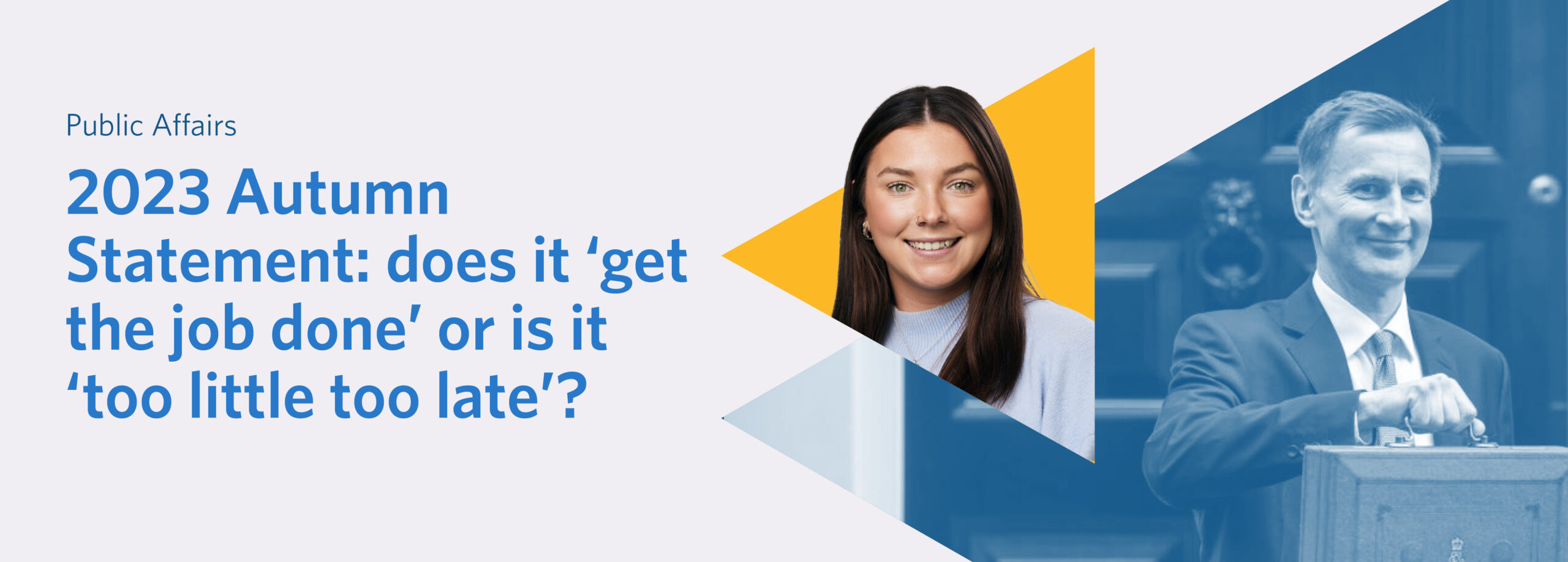
Today (22.11.23), the Chancellor of the Exchequer, Jeremy Hunt MP delivered the Government’s Autumn Statement to Parliament, saying he wanted to unlock investment, reward work and grow the economy. Containing over a hundred measures, the Chancellor felt he had reason to be positive: inflation is down, borrowing is down, and economic growth was better than expected. As a result, he had greater freedom to pursue the economic policies he believes in.
Hunt currently looks set to meet all of his self-imposed rules on borrowing, managing the annual deficit and debt over the next five years if the OBR’s forecasts prove correct). As a result, he was able to present a tax cutting statement which he hopes will help relieve the pressure of the cost-of-living crisis and maybe even deliver a boost in the polls for his Party. But there’s no such thing as a free lunch The OBR noted that the Chancellor had spent almost all of the £27bn windfall that was available to him, leaving him very little wiggle room and given the sluggish growth forecasts, this could be a risky approach ahead of 2024.
This could be the Chancellor’s last statement before the election and as such Hunt placed a strong emphasis on Rishi Sunak ‘getting the job done’. Measures outlining a rise in benefits and unfreezing of housing benefit should bring relief to moderate Conservative MPs who were concerned that the statement would not do enough to counter claims that their Party is ‘out of touch with normal people’. Meanwhile, the announcement of benefit sanctions will aim to appease those who sit further on the right of the Party. Finally, there were several attempts to mark ‘clear blue water’ between the two main parties with Hunt insisting that he would not give the unions “unaffordable pay offers”, not ban new gas and oil exploration, or increase borrowing by £28bn a year (in reference to Labour’s green prosperity plan).
The Shadow Chancellor, Rachel Reeves MP, responded that this statement was all ‘too little too late’ and that the Chancellor had lifted the lid on 13 years of economic failure. She tackled head on the Chancellor’s branding of the Autum Statement as a ‘budget for growth’ pointing out that the data doesn’t support this, and nor do the forecasts She also noted that nothing had been announced to compensate the cost-of-living crisis for struggling families. The Shadow Chancellor also hit back at the centrepiece of today’s Statement, the National Insurance cut, pointing out that it was the Prime Minister himself who increase it just last year (via the Health and Care levy something Labour opposed strongly at the time calling it “a tax on working people”). The Shadow Chancellor said that Labour’s plans will tackle the “root causes” of economic inactivity and bring the benefits bill down to help get Britain working.
The big question is, will this Autumn Statement mark a turning point and prompt a revival in the polls for the Conservatives or will it be ‘too little too late?
Jessica Kent, Senior Account Executive, Public Affairs, Fleishman UK
Find Out More
-
Platinum CMS Award
March 13, 2024
-
Changing Communications Tack at Mobile World Congress
February 21, 2024


